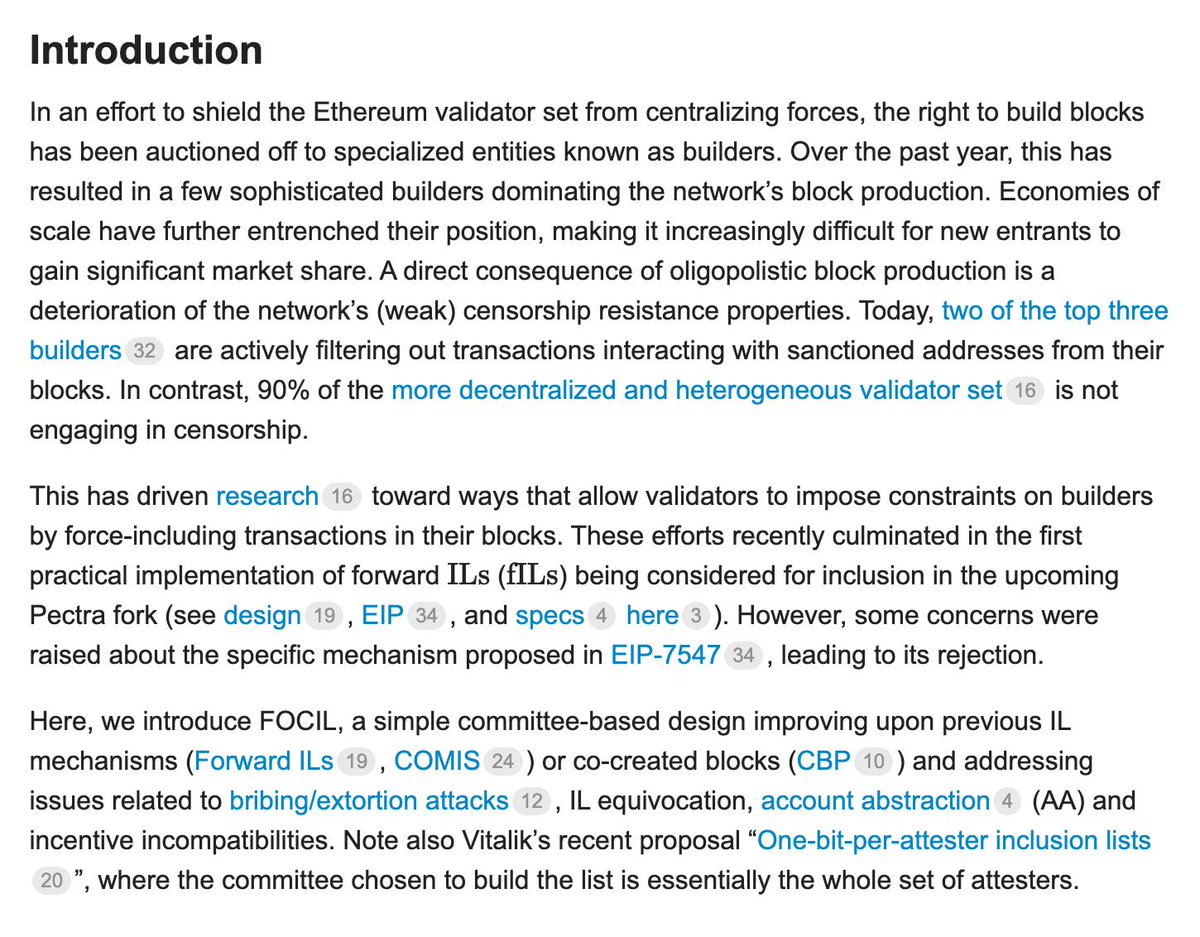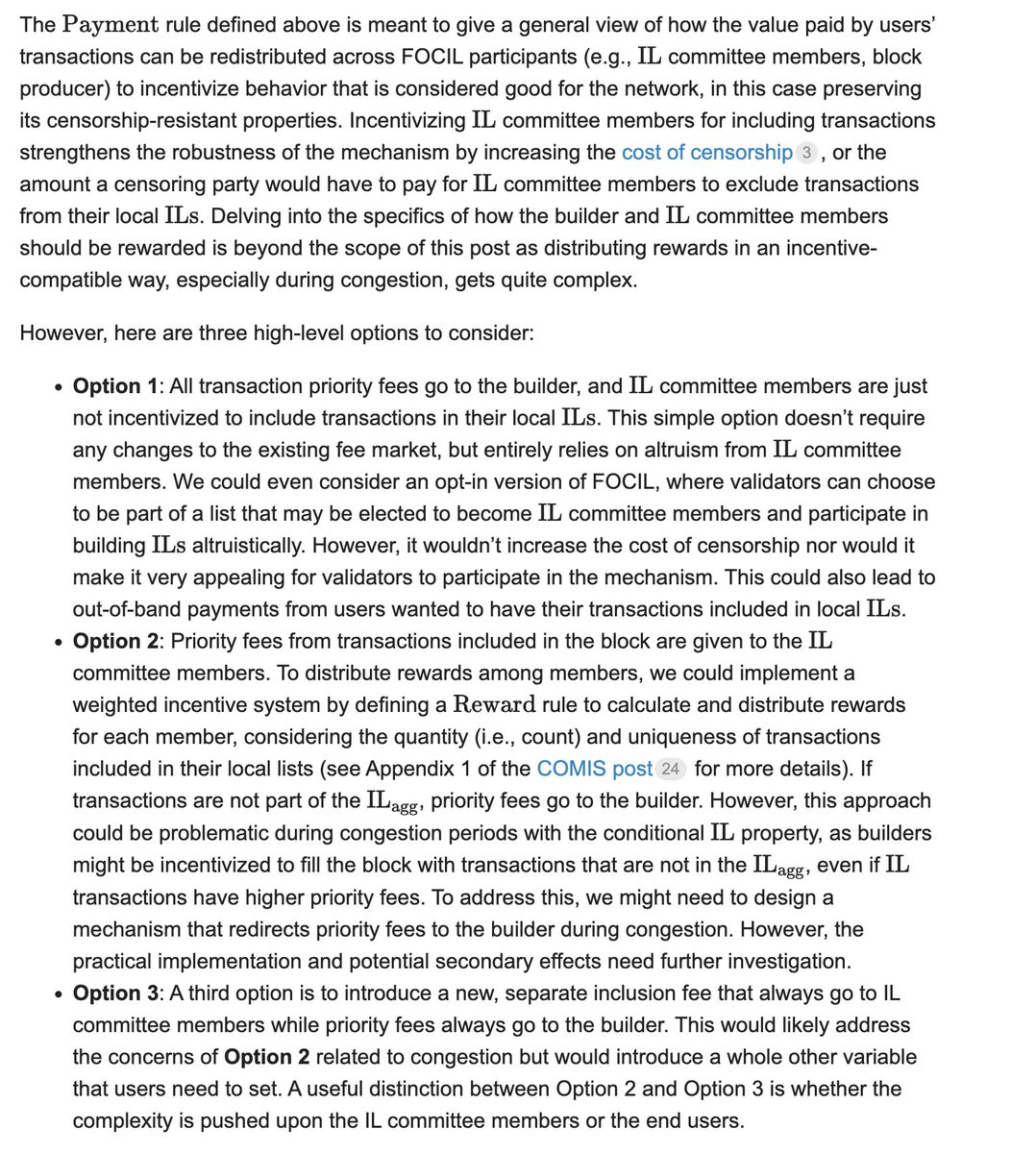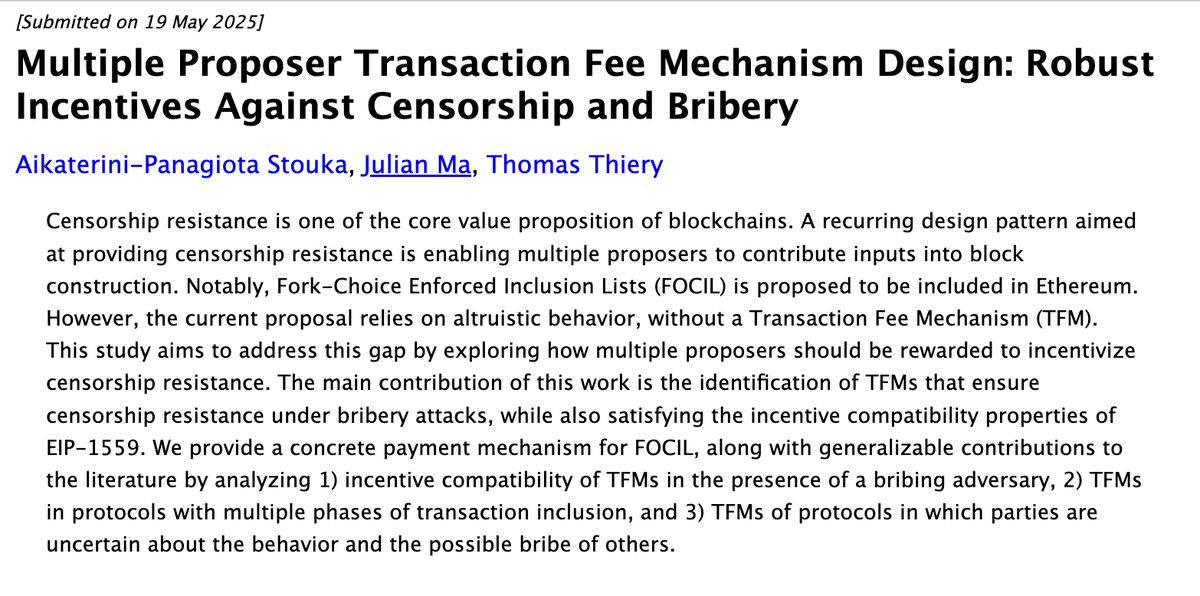I am pleading with the Ethereum community, do not let this braindead take stop you from enshrining censorship resistance in The New Internet. It is a cypherpunk's duty to enshrine freedoms for all, not to cower to what the gubbermint might want. Sanctions don't work anyways.
The case against FOCIL (which I learned about today):
ETH devs, I love you. You mean well. But when you create an EIP to solve the problem of "filtering out transactions with sanctioned addresses" and your solution is "to allow validators to impose constraints on builders by force-including transactions in their blocks"... we have a problem. A big problem. And if you don't see it, you're either being naive or reckless.
So far, the censorship resistance story on Ethereum has gone something like this:
1) ETH staking is permissionless to join
2) stakers can decide to include txns... so even if 99% of staking nodes censored tornado cash txns for example, it would just take 100x longer
This has worked out, in my opinion, more or less OK.
Even at peak Tornado Cash censorship, only 90% of nodes were censoring TC txns, so txns should have taken 150s instead of 15s.
This setup allowed node operators in the US who could potentially face legal risk for interacting with and facilitating txns to the sanctioned addresses (up to 20 years in prison for a sanctions violation) to simply filter them out and continue participating in the Ethereum network.
Even with the block builder oligopoly, only 2 out of 3 of the block builders are censoring, and as the OP mentioned, 90% of the rest of the validator set is NOT engaging in censorship.
What FOCIL does is FORCE INCLUDE TRANSACTIONS FROM SANCTIONED ADDRESSES, such that VALIDATORS CAN NO LONGER CHOOSE TO FILTER THEM OUT.
This is potentially a big problem for US validators, who now could face legal penalties for staking.
It appears the "plan" is to attempt to limit the legal liability of the validator chosen for each block by distributing the responsibility of deciding on txn inclusion across a set of attesters (other validators who are not chosen for the block) such that each block's validator can claim "well look, I didn't choose the txns in the blocks, I'm just validating them."
I don't have great faith in this plan.
The US government could:
1. Decide it doesn't care about the whole "attester" business and go after known validators who include sanctioned address txns in their blocks anyway.
2. Decide to go after the known attesters who decided to include a sanctioned address txn in the block.
3. Go after the core devs who designed a system to coerce the validators into including sanctioned address txns.
If you don't think they won't do #3, that's weird, because I didn't see you at either Alexey's or Roman's trial.
If I was the US gov, I would actually be 100% in favor of FOCIL. You mean to tell me the ETH validators are all going to be *forced* to incriminate themselves by validating blocks with sanctioned address txns? Well great, that means I can go after any ETH validator on US soil whenever I want, seize all their ETH, and prosecute them for a sanctions violation.
And you're telling me the ETH core devs made their *intent* to coerce validators into violating sanctions publicly available on the ETH research forum? Amazing, now I can even round up any relevant ETH core devs that might pass through the US and prosecute them for conspiracy as well.
It also doesn't help that, while FOCIL is currently not designed to provide any incentives validators to include specific txns, instead relying on "altruism" (here, altruism means the willingness to include txns from sanctioned addresses, bc of course it does 🤦♀️) this is also not the plan forever.
Currently, the plan is Option 1 - to simply rely on "altruistic" validators to attest to the sanctioned address txns, and not provide incentives to the attesters.
But I don't think the plan is for things to stay this way forever, as there is an active research effort into figuring out the best way to reward the attesters for their service. The paper below was published May 2025, and includes Julian Ma, one of the original authors of the OP.
In conclusion:
This isn't 2019 anymore. We can't afford to be naive about the implications of the systems we design and build anymore.
FOCIL would coerce ETH validators to include sanctioned address txns, and in doing so, could call into question the legality of ETH staking generally.
FOCIL could even incur legal liability on the core devs who designed and implemented it, because it was *explicitly* designed to stop validators from filtering out sanctioned address txns.
I love you all, but let's not.
cc @soispoke @barnabemonnot @fradamt @_julianma



3.08K
56
The content on this page is provided by third parties. Unless otherwise stated, OKX is not the author of the cited article(s) and does not claim any copyright in the materials. The content is provided for informational purposes only and does not represent the views of OKX. It is not intended to be an endorsement of any kind and should not be considered investment advice or a solicitation to buy or sell digital assets. To the extent generative AI is utilized to provide summaries or other information, such AI generated content may be inaccurate or inconsistent. Please read the linked article for more details and information. OKX is not responsible for content hosted on third party sites. Digital asset holdings, including stablecoins and NFTs, involve a high degree of risk and can fluctuate greatly. You should carefully consider whether trading or holding digital assets is suitable for you in light of your financial condition.


